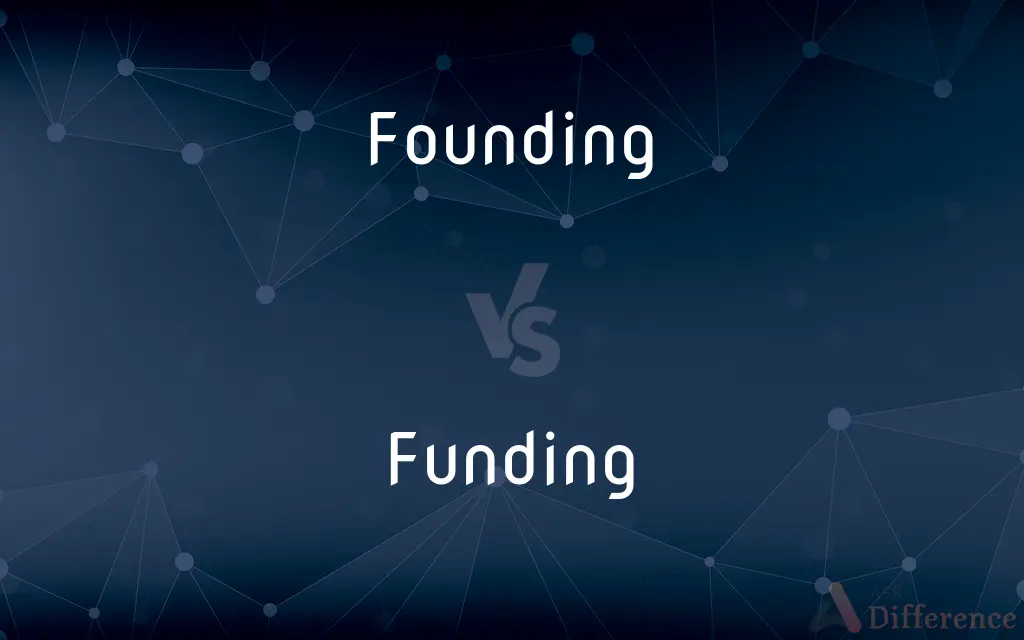Founding vs. Funding — What's the Difference?
By Fiza Rafique & Urooj Arif — Updated on March 20, 2024
Founding refers to the act of establishing or creating an organization, institution, or city, laying its initial structures and principles, while funding involves providing financial resources or capital necessary for its operation, development.

Difference Between Founding and Funding
Table of Contents
ADVERTISEMENT
Key Differences
Founding is the process of establishing something new, such as a company, organization, or city, often involving the development of its initial structure, goals, and principles. This act is pivotal in determining the future direction and identity of the entity. On the other hand, funding is the act of providing financial support, which could come in the form of investments, grants, or loans, essential for the operation and growth of an entity.
While the act of founding sets the mission, vision, and foundational structure of an organization or project, funding ensures that these visions can be practically pursued and achieved by providing the necessary financial resources. Funding is crucial for the sustainability and expansion of any entity, whereas founding is a one-time act that marks the beginning of an entity’s existence.
Founding often involves strategic planning, legal establishment, and the creation of a governance framework, requiring visionary leadership and a clear sense of purpose. Conversely, funding requires financial acumen, understanding of financial markets, and the ability to attract investors or secure grants, focusing on the economic viability of the entity.
The success of a founding venture significantly depends on its ability to secure adequate funding, highlighting the interconnectedness between these two concepts. Without sufficient funding, even the most well-founded initiatives can struggle to achieve their goals, whereas without a solid founding premise, securing funding can be challenging.
Comparison Chart
Definition
Establishing the basis of an entity
Providing financial resources
ADVERTISEMENT
Focus
Mission, vision, structure
Financial support, sustainability
Process
Strategic planning, legal setup
Investments, grants, loans
Requirement
Visionary leadership, purpose
Financial acumen, resource attraction
Outcome
Creation of an entity’s foundational aspects
Operational and developmental support
Compare with Definitions
Founding
Development of principles.
The founding principles guide the organization's direction.
Funding
Investment in a company.
The startup secured its initial funding from angel investors.
Founding
Creation of a city.
The founding of Boston was a pivotal moment in American history.
Funding
Support for operational costs.
The festival’s funding covered marketing and logistics.
Founding
Initial setup of an organization.
The founding members outlined the club’s charter.
Funding
Providing capital for development.
Funding the expansion required a bank loan.
Founding
Establishment of an entity.
The founding of the university in 1832.
Funding
Financial support for projects.
The project received funding from several grants.
Founding
Act of starting something new.
The founding of the new tech startup was announced yesterday.
Funding
Allocation of government resources.
The museum’s funding was increased this year.
Founding
To establish or set up, especially with provision for continuing existence
The college was founded in 1872.
Funding
Funding is the act of providing resources to finance a need, program, or project. While this is usually in the form of money, it can also take the form of effort or time from an organization or company.
Founding
To establish the foundation or basis of; base
Found a theory on firm evidence.
Funding
A source of supply; a stock
A fund of goodwill.
Founding
To melt (metal) and pour into a mold.
Funding
A sum of money or other resources set aside for a specific purpose
A pension fund.
Founding
To make (objects) by pouring molten material into a mold.
Funding
Funds Available money; ready cash
Short on funds.
Founding
Past tense and past participle of find.
Funding
An organization established to administer and manage a sum of money.
Founding
Present participle of found
Funding
Funds The stock of the British permanent national debt, considered as public securities. Used with the.
Founding
The establishment of something.
The founding of the republic
Funding
To provide funds for
Funded the space program.
A fully funded pension.
Founding
Who or that founds (establishes or starts) or founded.
The founding fathers of our country.
Funding
To convert (short-term government debt) into a long-term or floating debt with fixed interest payments.
Founding
The art of smelting and casting metals.
Funding
Present participle of fund
Funding
The action of the verb fund.
Funding
Money provided as funds.
The council is providing funding to the church to repair the roof.
Funding
Providing a fund for the payment of the interest or principal of a debt.
Funding
Investing in the public funds.
Funding
Financial resources provided to make some project possible;
The foundation provided support for the experiment
Funding
The act of financing
Common Curiosities
What is the significance of founding an organization?
It sets the mission, vision, and initial structure, determining its direction.
What are common sources of funding?
Investments, grants, loans, and government allocations.
Is founding a one-time event?
Yes, it marks the establishment of the entity, though its principles can evolve.
Can an entity exist without funding?
While it can exist, without funding, its operations and growth potential are severely limited.
How does the legal setup relate to founding?
It’s part of establishing the entity formally, including registration and compliance.
How do founders secure funding?
Through presenting business plans, networking, and demonstrating potential value to investors or grant committees.
Can funding influence the direction of an entity?
Yes, investors or donors may have specific interests that shape the entity’s focus.
What challenges do entities face in securing funding?
Competition, economic conditions, and proving viability can be significant hurdles.
What is the relationship between founding and funding?
Founding establishes the entity, and funding supports its operation and growth.
Can funding strategies evolve over time?
Yes, as the entity grows, its funding needs and strategies may shift.
How does funding impact an entity’s growth?
It provides the necessary financial resources for operations, development, and expansion.
Why is visionary leadership important in founding?
It guides the entity towards fulfilling its mission and overcoming challenges.
What role does strategic planning play in founding?
It’s crucial for setting clear goals, structures, and governance at the outset.
What impact does government funding have?
It can provide significant support for public services, infrastructure, and cultural projects.
How do founders and funders work together?
Through negotiation and collaboration to ensure mutual benefits and the achievement of the entity’s goals.
Share Your Discovery

Previous Comparison
Saturation vs. Chroma
Next Comparison
Point vs. VertexAuthor Spotlight
Written by
Fiza RafiqueFiza Rafique is a skilled content writer at AskDifference.com, where she meticulously refines and enhances written pieces. Drawing from her vast editorial expertise, Fiza ensures clarity, accuracy, and precision in every article. Passionate about language, she continually seeks to elevate the quality of content for readers worldwide.
Co-written by
Urooj ArifUrooj is a skilled content writer at Ask Difference, known for her exceptional ability to simplify complex topics into engaging and informative content. With a passion for research and a flair for clear, concise writing, she consistently delivers articles that resonate with our diverse audience.













































